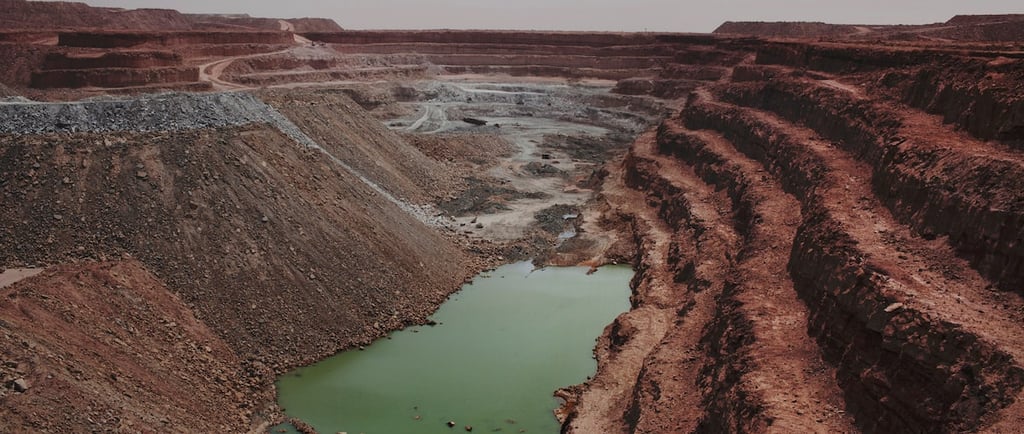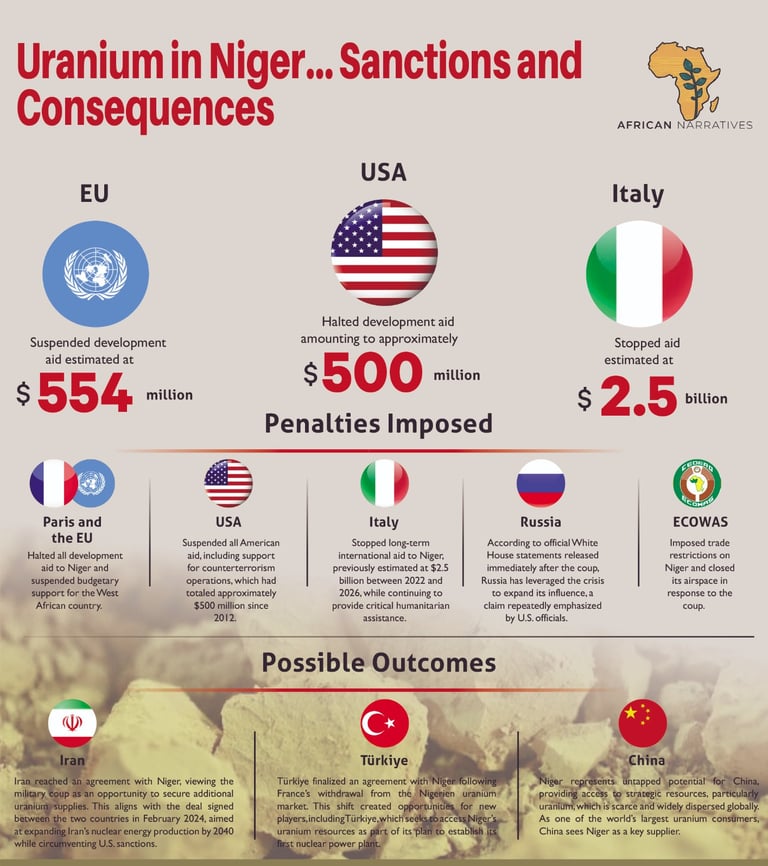Uranium Fuels International Conflict in Niger
Dr. Nourhan Abd El-Rahman, Lecturer of Economics, SVA
2/5/20253 min read


Military coups have become a recurring theme in some African nations. Niger is the third Sahel country, following Mali and Burkina Faso, to experience a coup since 2020. The July 26, 2023, coup led by General Abdourahamane Tchiani has placed Niger at the center of an international conflict revolving around its uranium resources. As a major uranium supplier, providing approximately 25.4% of the European Union's uranium imports and about 35% of France's needs (fueling 70% of its electricity production), the coup's implications are far-reaching. This is particularly significant given France's expanding nuclear power program and its increasing reliance on uranium to operate its 56 nuclear reactors.
This paper examines the strategic importance of Niger despite its economic challenges, analyzes the international conflict over its uranium, including sanctions and their consequences, and explores potential future scenarios.
I. The Geopolitical Significance of Niger
Despite its vast mineral wealth, including Africa's largest uranium reserves (representing approximately 5% of global reserves), Niger is ranked by the International Monetary Fund as the seventh poorest country globally (based on 2023 per capita GDP estimates). Several factors contribute to this paradox:
Political Factors: Niger's political instability, coupled with the historical control of its uranium resources by foreign companies, has hindered economic development. Dependence on uranium revenues, external debt, and foreign aid have further exacerbated the situation.
Economic Factors: Climate change, including desertification and fluctuating rainfall, impacts agricultural productivity and water resources. Mismanagement of these resources further compounds the economic challenges.
Niger's uranium reserves, making it the seventh largest producer globally, have attracted international attention. This was highlighted in 2003 with reports of Saddam Hussein's regime attempting to purchase uranium from Niger. The recent coup has reignited this global interest, as nations seek to secure access to this critical resource, especially given Europe's efforts to diversify its energy sources away from Russian gas.
II. Uranium in Niger: Sanctions and Consequences
General Tchiani's seizure of power has triggered international reactions, primarily focused on Niger's uranium. The global demand for nuclear energy is projected to increase significantly by 2050, driving up the price of uranium, especially with the US ban on Russian uranium imports.
Sanctions:
France and the EU: Following Niger's decision to halt uranium and gold exports to France, Paris imposed sanctions, including halting development aid and budget support. The French nuclear fuel company Orano also lost control of the Somaïr uranium mine. France received support from neighboring countries, including Algeria, which allowed the use of its airspace, a step not taken during the coups in Mali and Burkina Faso.
USA: While not officially halting aid, the US has warned that economic and security assistance could be at risk if democracy isn't restored. The reported uranium deal between Niger and Iran presents a further complication in US-Niger relations.
Italy: Italy has suspended long-term aid while maintaining critical assistance. This decision is driven by concerns over the coup's potential disruption of Italy's "Mattei Plan" for African partnerships and the perceived strengthening of ties between Niger and Russia.
ECOWAS: The Economic Community of West African States has imposed sanctions, including trade suspensions and airspace closures, and threatened military intervention.
Possible Outcomes:
Several scenarios are possible:
Increased Importance of Nuclear Energy: Geopolitical events have heightened the importance of nuclear energy. This has led to agreements like the Iran-Niger deal, and Turkey's increased interest in securing uranium for its nuclear power program.
International Competition for Uranium: The competition for Niger's uranium is intensifying, with countries like Turkey and China seeking to expand their influence in the region.
Ambitious Vision for Africa's Energy Infrastructure: Despite the instability, the military leadership in Niamey is engaging with stakeholders interested in the Algeria-Niger gas pipeline.
Two Key Scenarios:
Continued Military Control: The military council may maintain its grip on power and manage uranium resources independently, potentially strengthening ties with Russia, China, and Turkey.
US Military Presence: The US could leverage its position to prevent Russian influence, maintain security cooperation, and potentially secure the release of President Bazoum.
Conclusion:
This paper highlights the complex interplay of factors surrounding Niger's uranium resources. Despite being resource-rich, Niger remains economically disadvantaged due to historical exploitation and political instability. The coup has further complicated the situation, prompting international sanctions and intensifying competition for access to uranium. The future of Niger remains uncertain, with potential outcomes ranging from continued military rule to increased international involvement.
Download the full report here.


Empowerment
Amplifying African voices for sustainable progress together.
Contact US
Growth
Street No. 3281, N'Djamena, Republic of Chad.
© 2024. All rights reserved.